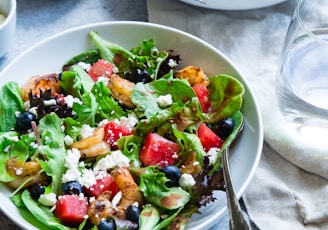After Care Advice
Our lifestyle guides provide general health & wellbeing information and tools to support your treatment plan. They may not meet your specific health care concerns, so please consult a healthcare professional if you need medical advice or support tailored to you. We also recommend seeking advice from other specialists, such as a nutritional therapist or personal trainer, for any targeted support you might need.
References
Nutrition Guide
Benton, D., & Donohoe, R. T. (1999). The effects of nutrients on mood. Public Health Nutrition, 2(3a), 403–409. https://doi.org/10.1017/S1368980099000564
Gómez-Pinilla, F. (2008). Brain foods: The effects of nutrients on brain function. Nature Reviews Neuroscience, 9(7), 568–578. https://doi.org/10.1038/nrn2421
Jacka, F. N., O’Neil, A., Opie, R., Itsiopoulos, C., Cotton, S., Mohebbi, M., ... & Berk, M. (2017). A randomised controlled trial of dietary improvement for adults with major depression (the 'SMILES' trial). BMC Medicine, 15(1), 23. https://doi.org/10.1186/s12916-017-0791-y
National Health Service (NHS). (2023). Eat well – Food and mood. https://www.nhs.uk/mental-health/self-help/tips-and-support/food-and-mood
O’Neil, A., Quirk, S. E., Housden, S., Brennan, S. L., Williams, L. J., Pasco, J. A., ... & Jacka, F. N. (2014). Relationship between diet and mental health in children and adolescents: A systematic review. American Journal of Public Health, 104(10), e31–e42. https://doi.org/10.2105/AJPH.2014.302110
World Health Organization (WHO). (2020). Healthy diet factsheet. https://www.who.int/news-room/fact-sheets/detail/healthy-diet
Hydration Guide
Benton, D., & Young, H. A. (2015). Do small differences in hydration status affect mood and cognitive function? Nutrition Reviews, 73(Supplement_2), 83–96. https://doi.org/10.1093/nutrit/nuv045
Ganio, M. S., Armstrong, L. E., Casa, D. J., McDermott, B. P., Lee, E. C., Yamamoto, L. M., & Marzano, S. (2011). Mild dehydration impairs cognitive performance and mood of men. British Journal of Nutrition, 106(10), 1535–1543. https://doi.org/10.1017/S0007114511002005
Masento, N. A., Golightly, M., Field, D. T., Butler, L. T., & van Reekum, C. M. (2014). Effects of hydration status on cognitive performance and mood. British Journal of Nutrition, 111(10), 1841–1852. https://doi.org/10.1017/S0007114513004455
Popkin, B. M., D’Anci, K. E., & Rosenberg, I. H. (2010). Water, hydration and health. Nutrition Reviews, 68(8), 439–458. https://doi.org/10.1111/j.1753-4887.2010.00304.x
Spigt, M. G., Weerkamp, N., Troost, J., van Schayck, O. C., & Knottnerus, J. A. (2012). A randomized trial on the effects of regular water intake in patients with recurrent headaches. Family Practice, 29(4), 370–375. https://doi.org/10.1093/fampra/cmr112
World Health Organization (WHO). (2005). Nutrient requirements for water. In Vitamin and mineral requirements in human nutrition (2nd ed.). https://apps.who.int/iris/handle/10665/42716
Relaxation Guide
Berman, M. G., Jonides, J., & Kaplan, S. (2008). The cognitive benefits of interacting with nature. Psychological Science, 19(12), 1207–1212. https://doi.org/10.1111/j.1467-9280.2008.02225.x
Chiesa, A., & Serretti, A. (2009). Mindfulness-based stress reduction for stress management in healthy people: A review and meta-analysis. Journal of Alternative and Complementary Medicine, 15(5), 593–600. https://doi.org/10.1089/acm.2008.0495
Hansen, M. M., Jones, R., & Tocchini, K. (2017). Shinrin-Yoku (Forest Bathing) and nature therapy: A state-of-the-art review. International Journal of Environmental Research and Public Health, 14(8), 851. https://doi.org/10.3390/ijerph14080851
Porges, S. W. (2011). The polyvagal theory: Neurophysiological foundations of emotions, attachment, communication, and self-regulation. New York: W. W. Norton & Company.
Ulrich, R. S., Simons, R. F., Losito, B. D., Fiorito, E., Miles, M. A., & Zelson, M. (1991). Stress recovery during exposure to natural & urban environments. Journal of Environmental Psychology, 11(3), 201–230. https://doi.org/10.1016/S0272-4944(05)80184-7
Van der Kolk, B. A. (2014). The body keeps the score: Brain, mind, and body in the healing of trauma. New York: Viking.
Zajonc, A. (2009). Meditation as contemplative inquiry: When knowing becomes love. Great Barrington, MA: Lindisfarne Books.
Sleep Guide
American Academy of Sleep Medicine. (2014). International classification of sleep disorders (3rd ed.). Darien, IL: American Academy of Sleep Medicine.
Chiu, H. Y., Chang, L. Y., Hsieh, Y. J., Tsai, P. S. (2018). A meta-analysis of sleep education interventions for older adults. Geriatric Nursing, 39(6), 623–630. https://doi.org/10.1016/j.gerinurse.2018.06.002
Grandner, M. A., & Fernandez, F. X. (2021). The role of sleep in emotional brain function. Annual Review of Clinical Psychology, 17, 679–707. https://doi.org/10.1146/annurev-clinpsy-081219-104918
Hirshkowitz, M., Whiton, K., Albert, S. M., Alessi, C., Bruni, O., DonCarlos, L., ... & Adams Hillard, P. J. (2015). National Sleep Foundation’s sleep time duration recommendations: Methodology and results summary. Sleep Health, 1(1), 40–43. https://doi.org/10.1016/j.sleh.2014.12.010
Irish, L. A., Kline, C. E., Gunn, H. E., Buysse, D. J., & Hall, M. H. (2015). The role of sleep hygiene in promoting public health: A review of empirical evidence. Sleep Medicine Reviews, 22, 23–36. https://doi.org/10.1016/j.smrv.2014.10.001
Kay, D. B., & Buysse, D. J. (2017). Sleep and emotion: A clinical perspective. Current Opinion in Psychology, 17, 47–52. https://doi.org/10.1016/j.copsyc.2017.06.014
Morin, C. M., & Benca, R. (2012). Chronic insomnia. The Lancet, 379(9821), 1129–1141. https://doi.org/10.1016/S0140-6736(11)60750-2
Perlis, M. L., Jungquist, C., Smith, M. T., & Posner, D. (2005). Cognitive behavioral treatment of insomnia: A session-by-session guide. Springer.
Walker, M. (2017). Why we sleep: Unlocking the power of sleep and dreams. New York: Scribner.
World Health Organization (WHO). (2021). Guidelines on mental health promotive and preventive interventions for adolescents: Helping adolescents thrive. https://www.who.int/publications/i/item/9789240025553
THANK YOU FOR VISITING
Please like and follow our socials, or sign up to our seasonal newsletter.
Contact us
hello@northeastclinical.co.uk
WhatsApp Chat 07368 638324
© North East Clinical 2025. All rights reserved.








